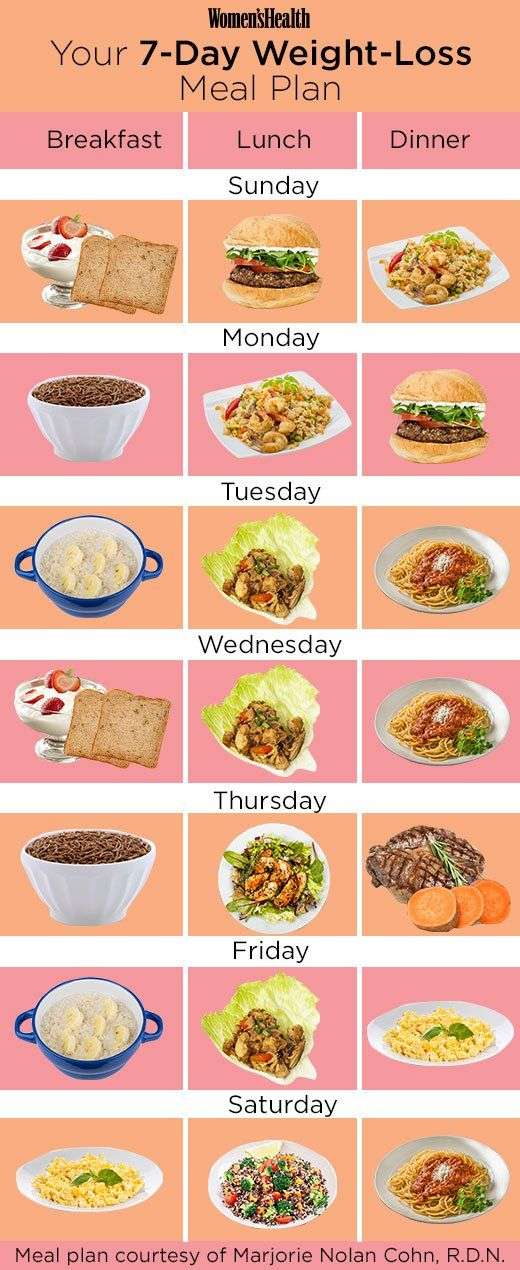In this article, you will learn about the best foods for weight loss. We will discuss the importance of incorporating these foods into your diet and how they can help you in your weight loss journey. From nutrient-dense fruits and vegetables to lean proteins and whole grains, we will explore a variety of options that can boost your metabolism and support your goals. So, let’s dive in and discover the delicious and nutritious foods that will aid in your weight loss efforts.
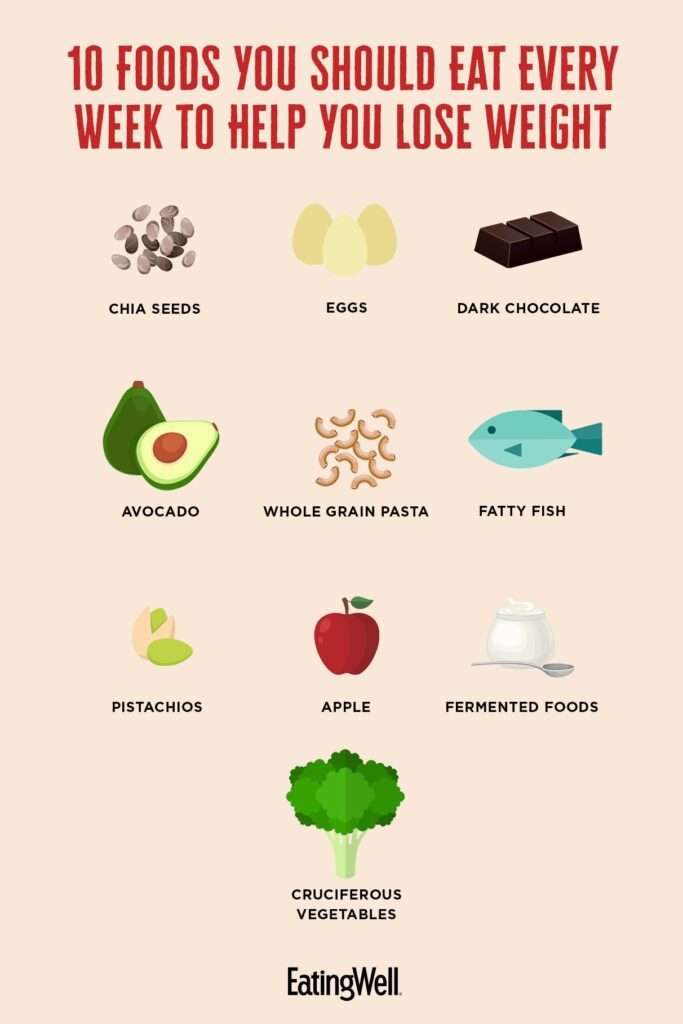
Understanding weight loss
Calories and weight loss
When it comes to weight loss, the first thing to understand is the role of calories. Calories are units of energy that our bodies need to function properly. When we consume more calories than we burn, our bodies store the excess as fat, leading to weight gain. Conversely, when we consume fewer calories than we burn, our bodies start using stored fat for energy, resulting in weight loss.
Factors affecting weight loss
While calories are an important factor in weight loss, there are other factors that can also influence the rate at which you lose weight. These include genetics, metabolism, hormone levels, age, and overall health. It’s important to keep in mind that weight loss is a gradual process and that everyone’s journey is unique.
Benefits of weight loss
Weight loss can bring about several health benefits. It can reduce the risk of developing chronic diseases such as diabetes, heart disease, and certain types of cancer. It can also improve overall mobility, increase energy levels, enhance self-confidence, and promote better sleep. Achieving and maintaining a healthy weight can significantly improve your quality of life.
The role of diet in weight loss
Importance of a healthy diet
A healthy diet is crucial for successful weight loss. It provides the necessary nutrients and energy to support your body’s functions while also helping you create a calorie deficit. A balanced diet that includes a variety of foods can ensure that you get all the essential nutrients while also promoting weight loss.
Choosing the right foods
When it comes to weight loss, not all foods are created equal. Some foods are more nutrient-dense and can help you stay satisfied for longer, while others are high in calories and offer little nutritional value. Opting for whole, unprocessed foods is generally a good idea. These foods are often lower in calories and higher in nutrients, making them a better choice for weight loss.
Creating a calorie deficit
To lose weight, you need to create a calorie deficit, which means consuming fewer calories than you burn. This can be achieved by reducing portion sizes, choosing lower-calorie options, and increasing physical activity. It’s important to find a balance that works for you and to focus on creating sustainable habits rather than resorting to extreme diets or restrictions.
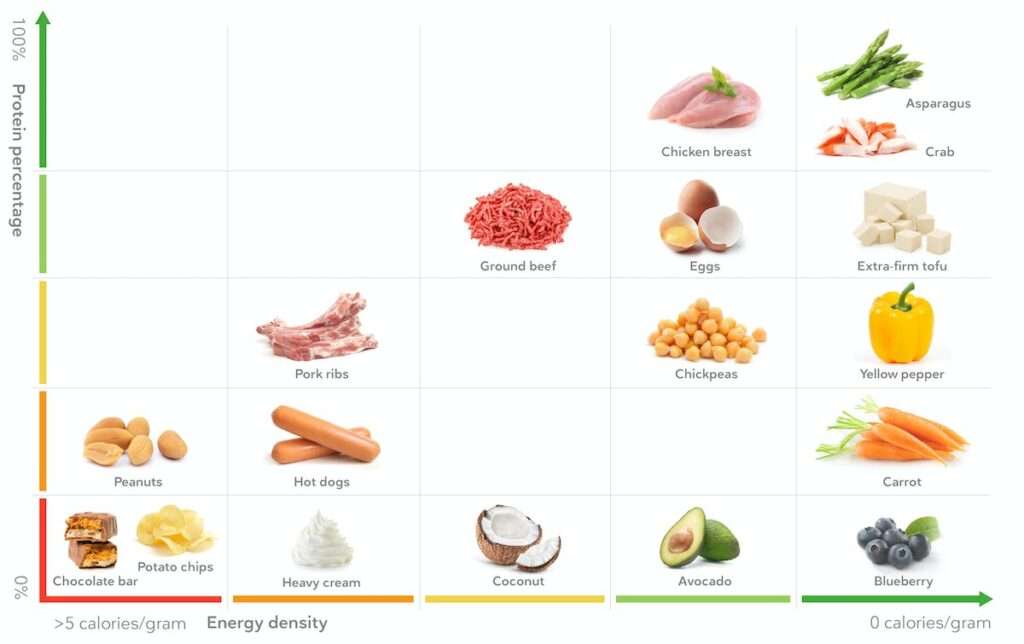
Foods that promote weight loss
Lean proteins
Protein is an essential nutrient that plays a vital role in weight loss. It helps build and repair tissues, promotes muscle growth, and contributes to a feeling of fullness. Opting for lean protein sources such as chicken, fish, tofu, and legumes can provide the necessary protein without adding excessive calories.
Fiber-rich foods
Fiber is another nutrient that can support weight loss efforts. It adds bulk to your meals, helping you feel full and satisfied while consuming fewer calories. Foods high in fiber include fruits, vegetables, whole grains, and legumes. Incorporating these into your diet can help you stay on track with your weight loss goals.
Healthy fats
Contrary to popular belief, not all fats are bad for you. Healthy fats, such as those found in avocados, nuts, seeds, and olive oil, can actually support weight loss. These fats help keep you satisfied, promote nutrient absorption, and provide essential fatty acids that your body needs.
Whole grains
Unlike refined grains, whole grains contain more fiber and nutrients. They take longer to digest, which can help regulate blood sugar levels and keep you feeling fuller for longer. Adding whole grains like quinoa, brown rice, whole wheat bread, and oats to your diet can be beneficial for weight loss.
Low-calorie fruits and vegetables
Fruits and vegetables are low in calories and high in nutrients, making them an excellent choice for weight loss. They provide essential vitamins, minerals, and antioxidants to support overall health while adding bulk to your meals. Incorporating a variety of colorful fruits and vegetables into your diet can help control hunger and reduce calorie intake.
Meal planning for weight loss
Setting realistic goals
When it comes to weight loss, setting realistic goals is important for long-term success. Aim for a gradual and steady weight loss of 1-2 pounds per week. This allows your body to adjust and ensures that you develop sustainable habits.
Portion control
Portion control is a key aspect of successful weight loss. It’s important to be mindful of your portion sizes and to avoid eating larger portions than you need. Paying attention to portion sizes can help you manage calorie intake and prevent overeating.
Balancing macronutrients
In addition to portion control, it’s important to balance macronutrients in your meals. Aim to include a source of lean protein, healthy fats, and complex carbohydrates in each meal. This balance ensures that you get the necessary nutrients while also supporting weight loss.
Snack choices
Healthy snacks can be a great addition to your weight loss journey. Opting for snacks that are high in protein and fiber can help keep you satisfied between meals and prevent overeating. Some examples of healthy snacks include Greek yogurt, carrot sticks with hummus, and handfuls of nuts or seeds.
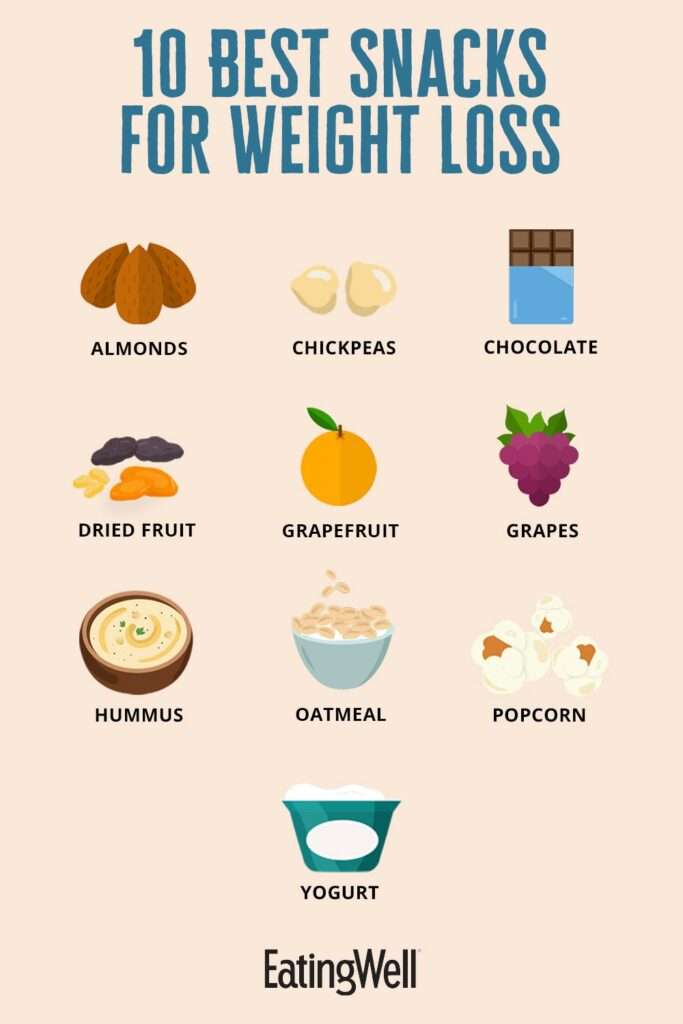
Best foods to eat for breakfast
Protein-packed options
Starting your day with a protein-packed breakfast can help you feel fuller for longer and reduce cravings throughout the day. Some protein-rich breakfast options include eggs, Greek yogurt, cottage cheese, or protein smoothies made with milk or plant-based protein powder.
Whole grain cereals
Whole grain cereals can be a convenient and nutritious option for breakfast. Look for cereals that are low in added sugars and high in fiber. Pairing them with milk or yogurt and adding some fresh fruit can make for a satisfying, weight-loss-friendly meal.
Fruit and yogurt combinations
Combining fruits with yogurt can provide a balanced and flavorful breakfast option. Opt for plain or Greek yogurt and add your favorite fruits such as berries, sliced banana, or diced apple. This combination offers a good balance of protein, fiber, and natural sugars.
Healthy smoothies
Smoothies can be a quick and easy breakfast option, especially for those on the go. To make a healthy smoothie, combine a source of protein (such as Greek yogurt or protein powder), fruits or vegetables, and a liquid base (such as milk or water). Be mindful of the ingredients you add to avoid excessive calorie intake.
Lunch and dinner choices for weight loss
Leafy green salads
Leafy green salads are a great choice for weight loss as they are low in calories and high in nutrients. Start with a base of greens such as spinach or kale and add a variety of colorful vegetables. Top with a source of lean protein such as grilled chicken or tofu, and dress with a light vinaigrette or lemon juice.
Grilled or baked lean meat
Opting for grilled or baked lean meat can provide a satisfying and protein-rich meal. Choose lean cuts of meat such as chicken breast, turkey, or fish. Avoid frying or adding excessive sauces to keep the calorie content low.
Vegetable stir-fries
Vegetable stir-fries can be a delicious and healthful option for lunch or dinner. Use a variety of colorful vegetables and cook them in a small amount of oil or broth. Add a source of lean protein such as tofu or shrimp, and season with herbs, spices, and a low-sodium sauce.
Healthy soup options
Soups can be a filling and nutritious option for weight loss. Opt for broth-based soups that are lower in calories and avoid creamy or high-fat options. Add plenty of vegetables, lean protein, and whole grains to make it a well-rounded meal.
Fish and seafood
Fish and seafood are excellent choices for weight loss due to their high protein content and lower calorie density. Include options such as salmon, tuna, shrimp, or cod in your meals. Grilling, baking, or steaming them can help preserve their natural flavors and avoid adding excess calories.
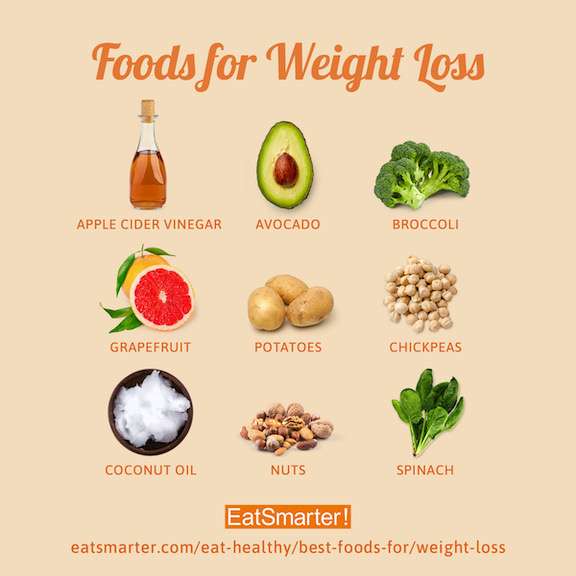
Snacks for weight loss
Nuts and seeds
Nuts and seeds can be a satisfying and nutritious snack option. They provide healthy fats, fiber, and protein, which help keep you fuller for longer. However, be mindful of portion sizes as they are high in calories. Stick to a small handful or pre-portioned snack packs to avoid overeating.
Fresh fruit
Fresh fruits are a healthy and refreshing snack choice, as they are low in calories and high in vitamins and fiber. Enjoy a piece of fruit on its own or pair it with a source of protein, such as a handful of almonds or a small serving of Greek yogurt, to make it more satisfying.
Greek yogurt
Greek yogurt is not only a great source of protein but also provides probiotics that support gut health. Choose plain, unsweetened Greek yogurt and add some fresh fruit or a drizzle of honey for natural sweetness. This creamy and nutritious snack can keep you satisfied between meals.
Vegetable sticks with hummus
Vegetable sticks, such as carrot, celery, or bell pepper, can be paired with a serving of hummus for a crunchy and nutritious snack. Hummus provides protein and healthy fats, while the vegetables offer vitamins, minerals, and fiber. This combination keeps you satisfied and adds color to your snack time.
Beverages for weight loss
Water as the best choice
Water is the best beverage choice for weight loss. It has zero calories and helps keep you hydrated. Drinking an adequate amount of water can also help control appetite, prevent overeating, and support your body’s natural detoxification processes.
Green tea
Green tea is known for its antioxidant properties and potential metabolism-boosting effects. It contains catechins and caffeine, which can help enhance fat burning. However, it’s important to consume it in moderation and without added sugars or creams to avoid adding unnecessary calories.
Herbal teas
Herbal teas, such as chamomile, peppermint, or ginger tea, can be a calming and hydrating choice. They offer a variety of flavors without adding calories. Herbal teas can be enjoyed hot or cold, depending on your preference.

Eating out and weight loss
Making healthier choices
Eating out doesn’t have to derail your weight loss efforts. When dining out, opt for healthier choices such as grilled or roasted meats, salads with dressing on the side, steamed vegetables, and whole grain options. Look for menu items that are prepared using healthier cooking methods and avoid deep-fried or heavily sauced dishes.
Avoiding high-calorie options
Avoid or limit high-calorie options such as appetizers, deep-fried foods, creamy sauces, sugary drinks, and desserts. These items can quickly add up in terms of calories and may sabotage your weight loss efforts. Instead, focus on enjoying the company and conversation while making mindful choices.
Portion control tips
Restaurants often serve large portion sizes, which can lead to overeating. To control portions, consider sharing a meal with a friend or saving some for later. You can also ask for a to-go box and pack half of your meal before you start eating. Remember, you can always order a side salad or a vegetable dish to supplement your meal.
Conclusion
Maintaining a healthy weight
Achieving and maintaining a healthy weight is a lifelong journey. It requires making conscious choices about the foods we eat, portion sizes, and overall lifestyle. By incorporating the best foods for weight loss into your diet, you can create a sustainable and enjoyable eating plan that supports your health and well-being.
Lifestyle changes
While focusing on the best foods for weight loss is important, it’s also essential to make other lifestyle changes to support your goals. Regular physical activity, stress management, adequate sleep, and mindful eating are all part of a holistic approach to weight loss and overall health.
Long-term success
Remember, weight loss is not a quick fix but a long-term commitment. It’s essential to develop sustainable habits and cultivate a positive relationship with food. Be patient with yourself, celebrate small victories, and seek support when needed. With time and persistence, you can achieve your weight loss goals and maintain a healthy lifestyle.
